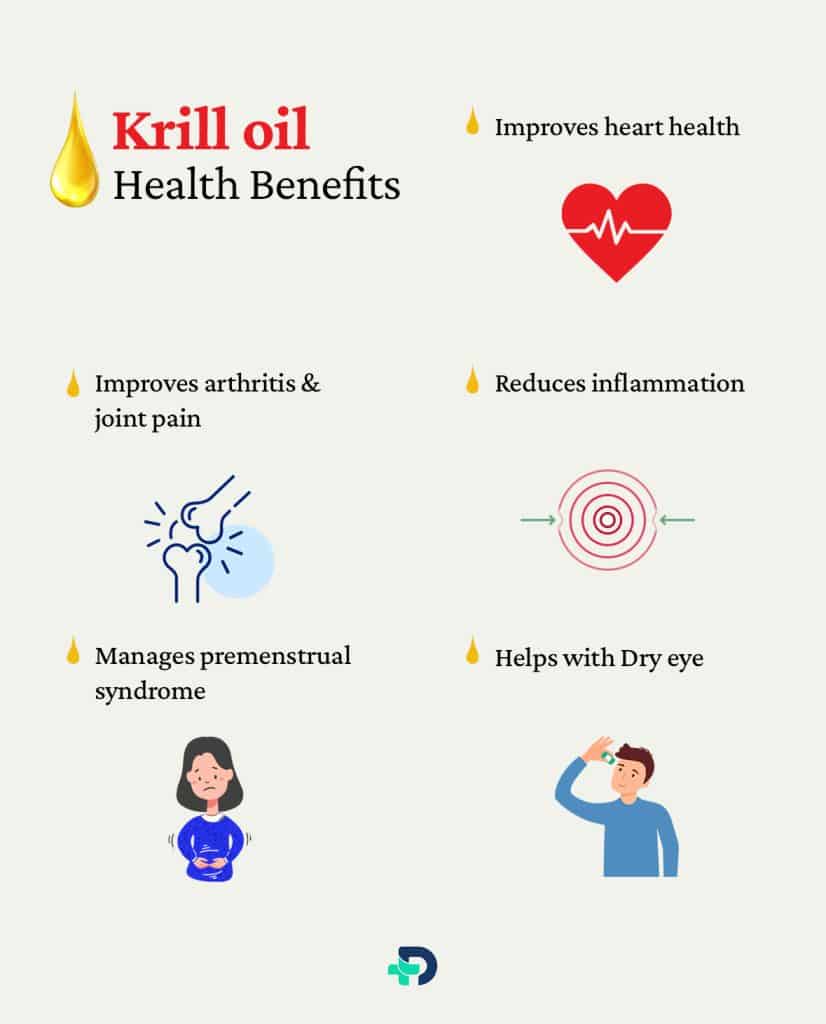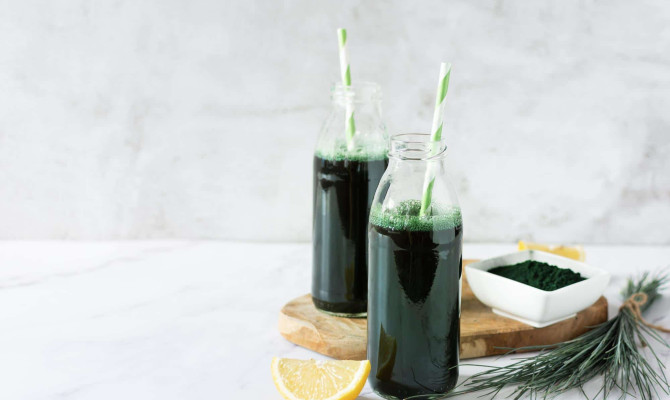Krill Oil : Benefits and Precautions

- Krill Oil
- 16 Aug 2023
Overview
What is Krill oil ?
Krill oil is obtained from krill, which are little, partially transparent crustaceans that eat tiny plants such as phytoplankton and algae. Krill is at the bottom of the food chain and can be found throughout the ocean, especially in the Southern Ocean. (1) Antarctic krill oil and Euphausia superba oil are other names for krill oil as they are extracted from Euphausia superba, an Antarctic krill species. As a dietary supplement, processed krill oil is frequently offered for sale. This article covers a few krill oil facts, including its components, multiple health benefits, adverse reactions, hazards, and medicine interactions.1Overview| Researched based study from Noaa.gov

Fish oil
Krill oil vs. Fish oil
- Fish oil and krill are different. Compared to fish oil, krill oil is less well-known globally.
- Omega-3 fatty acids, particularly eicosapentaenoic acid (EPA) and docosahexaenoic acid (DHA) are abundant in krill oil and oceanic fish oil.
- The omega-3 fatty acids in krill oil are thought to be more quickly absorbed by the body than those in fish oil2Fish oil| Researched based study from Nlm.nih.gov
- Phospholipids like phosphatidylcholine sometimes called marine lecithin, are also found in krill oils. No items made from fish, plants, or algae contain these phospholipids.
- Astaxanthin, a naturally occurring antioxidant, lends krill oil its crimson hue, while fish oil is usually yellow.
- The longevity gene (FOXO3) is reported to be increased by astaxanthin, a carotenoid.3Fish oil| Researched based study from Alzdiscovery.org
Dosage
Dietary requirement
Based on a person’s gender and age, they may need different amounts of omega-3 each day. AI is the typical daily recommended intake in grams 3Dosage| Researched based study from Alzdiscovery.org
For infants till one year
The AIs refer to total omega-3s for newborns
- Birth to 6 months – 0.5 g/day
- 7 to 12 months – 0.5 g/day
The AIs are limited to only ALA for those one and older since ALA is the only type of omega-3 necessary.
For kids
- 1 to 3 years – 0.7 g/day
- 4 to 8 years – 0.9 g/day
9 to 13 years
- Men – 1.2 g/day
- Women – 1.0 g/day
14 to 18 years
- Men – 1.6 g/day
- Women – 1.1 g/day
- Pregnant women – 1.4 g/day
- Lactating mothers – 1.3 g/day
19 to 50 years
- Men – 1.6 g/day
- Women – 1.1 g/day
- Pregnant women – 1.4 g/day
- Lactating mothers – 1.3 g/day
51 years and above
- Men – 1.6 g/day
- Women – 1.1 g/day
Dosage forms
The dosage may vary according to body type, weight, age, and gender.
- Krill oil is available in capsule form.
- The recommended daily intake for krill oil is between 300 and 2000 mg.4Dosage| Researched based study from Od.nih.gov
- The ODS also warns against taking more than 2 g of EPA and DHA daily in dietary supplements.
- To determine how much ingredient is in each capsule, a person should carefully read the supplement labels.
- Consult with a doctor for the appropriate dosage for any individual.
Health Benefits

Krill oil health benefits
The following are various benefits of krill oil supplements:
- Improves heart health
- Reduces inflammation
- Improves arthritis and joint pain
- It helps with Dry eye
- Manages premenstrual syndrome (PMS)
Improves heart health
- A study indicated that krill oil was more effective than fish oil at lowering bad cholesterol and raising good cholesterol levels in the blood.5Health benefits| Researched based study from Nlm.nih.gov
Reduces inflammation
- Omega-3 fatty acids reduce inflammation, and astaxanthin, an antioxidant, is found in krill oil. In individuals with persistent inflammation, they aid in decreasing inflammation. 6Health benefits| Researched based study from Nlm.nih.gov
Improves arthritis and joint pain
- Due to its anti-inflammatory qualities, krill oil supplementation eases pain associated with conditions including osteoarthritis and rheumatoid arthritis.7Health benefits| Researched based study from Nlm.nih.gov ,8Health benefits| Researched based study from Nlm.nih.gov
Helps with Dry eye
- Krill oil contains phospholipid-rich omega-3 EFAs that may have additional therapeutic benefits by reducing dry eye symptoms.9Health benefits| Researched based study from Nlm.nih.gov
Manages premenstrual syndrome (PMS)
- Research has shown that krill oil is more effective than omega-3 fish oil at reducing menstrual pain and other emotional troubles like mood swings, depression, and irritability during premenstrual syndrome.10Health benefits| Researched based study from Nlm.nih.gov
Other krill oil uses are being considered, but more reliable data is needed to indicate if they may be beneficial.
Side effects
Side effects of Krill oil
Krill oil side effects may include :
- Oily skin
- Bloating
- Flatulence 11Side effects| Researched based study from Clevelandclinicwellness.com
- Diarrhea
- Bleeding
- Heartburn
- Decreased hunger
Allergic reactions like:
- Itching
- Irritated skin
- Hives
- Trouble breathing
- Fainting
- Swollen lips, tongue, or throat.12Side effects| Researched based study from Mayoclinic.org
- Nasal stuffiness
- Choking feel
If one experiences symptoms of allergic reactions, they should consult a doctor immediately.
Precautions
Precautions
- To prevent any adverse effects, always begin with any dietary supplement with a low dosage and increase it over time to meet the requirement.
- Individuals with allergies to seafood, such as fish, shrimp, or other shellfish, should avoid using krill oil supplements.
- It is not currently recommended in pregnant women and breastfeeding moms, although krill oil is less likely to contain pollutants.13Precautions| Researched based study from Nsw.gov.au
- Because it may reduce blood clotting and raise the risk of bleeding, people with bleeding disorders should use krill oil cautiously.
- People who have surgery should avoid consuming krill oil for at least two weeks before the procedure since it may cause bleeding.
Interactions
Krill oil interactions with other medicines
Krill oil may interact with other medicines like:
- Blood thinners
- Birth control pills
- Beta-blockers
- Diuretics
- Weight loss drug
Blood thinners
- Like aspirin, warfarin, and other NSAIDs may prevent blood clotting; since krill oil also has a similar effect, it is better to avoid them.14Interactions| Researched based study from Clevelandclinic.org
Birth control pills
- Krill oil may interact with birth control pills or estrogen hormone replacement therapies. 3Interactions| Researched based study from Alzdiscovery.org
Beta-blockers
- Like carvedilol, atenolol may interact with krill oil supplements.3Interactions| Researched based study from Alzdiscovery.org
Diuretics
- Also called as water pills may interact with krill oil supplements. e.g., chlorothiazide.
Orlistat
- It is a weight loss medicine that could interact with krill oil.3Interactions| Researched based study from Alzdiscovery.org
Bottom line
The Bottom Line
As a supplement, krill oil has several benefits, including a higher phospholipid content, lower levels of contaminants like mercury, and no fishy aftertaste. However, the slightly greater absorption of krill oil may not be sufficient to make it preferable to fish oil because the latter contains substantially more EPA and DHA. Many people believe krill oil is less beneficial for usage than fish oil or DHA supplements because the doses in typical capsules are significantly lower. However, before taking any supplements, people should speak with a doctor. It is still beneficial to consume fresh seafood rich in EPA/DHA than any seafood oils in capsules.
Any feedback on this article?
 This Articles content was accurate
This Articles content was accurate Very Informative Article
Very Informative Article I have a question or a comment
I have a question or a comment
 This article contains inaccurate content
This article contains inaccurate content This article was not helpful
This article was not helpful I have a question or a comment
I have a question or a comment
We appreciate your helpful feedback!
Checkout our social pages
References
-
Ocean Today
Animals of the Ice: Antarctic Krill | Overview
-
National Library of Medicine
Omega-3 Fatty Acids. | Fish oil
-
Alzheimer’s Drug Discovery Foundation
Krill Oil | Fish oil
-
National Institutes of Health
Omega-3 Fatty Acids-Fact Sheet for Health Professionals | Dosage
-
National Library of Medicine
Evaluation of the effects of Neptune Krill Oil on the clinical course of hyperlipidemia | Health Benefits
-
National Library of Medicine
Krill oil reduces intestinal inflammation by improving epithelial integrity and impairing adherent-invasive Escherichia coli pathogenicity | Health Benefits
-
National Library of Medicine
Evaluation of the effect of Neptune Krill Oil on chronic inflammation and arthritic symptoms | Health Benefits
-
National Library of Medicine
Krill Oil Improves Mild Knee Joint Pain: A Randomized Control Trial | Health Benefits
-
National Library of Medicine
A Randomized, Double-Masked, Placebo-Controlled Clinical Trial of Two Forms of Omega-3 Supplements for Treating Dry Eye Disease | Health Benefits
-
National Library of Medicine
Evaluation of the effects of Neptune Krill Oil on the management of premenstrual syndrome and dysmenorrhea | Health Benefits
-
Cleveland Clinic Wellness
Krill oil | Side effects
-
Mayo Clinic
Shellfish allergy | Side effects
-
NSW Medications in Pregnancy and Breastfeeding Service
Omega 3 fats in pregnancy and breastfeeding | Precautions
-
Cleveland Clinic
A Look at Krill Oil’s Benefits | Interactions






































